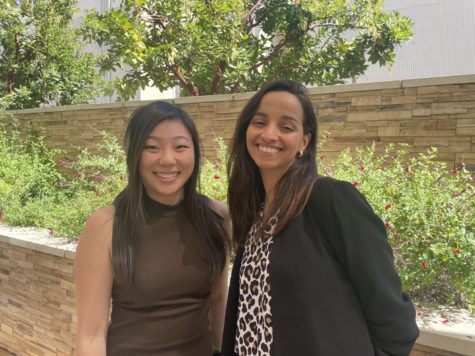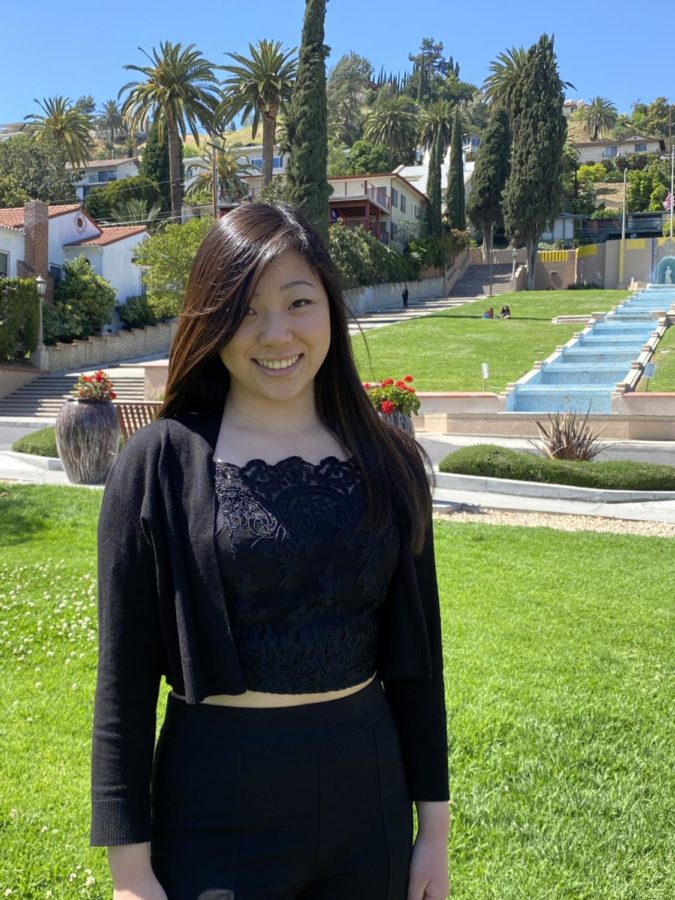Meet the First Fellow of the GCC Pulitzer Center Campus Consortium
Q&A with Jacqueline Kamei

Jacqueline Kamei was ecstatic when she opened the email from the Pulitzer Center on Feb. 18 informing her that she’d been selected to be Glendale Community College’s first Reporting Fellow, she said in a recent email interview.
In her first year at GCC as a psychology major and the editor-in-chief of El Vaquero, Kamei is the first fellowship recipient of the GCC Pulitzer Center Campus Consortium.
The GCC partnership with the Pulitzer Center was co-founded by co-directors Dr. Reut Cohen Schorr and Professor Michelle Stonis, GCC professors of Journalism and History, respectively. “The Journalism program and History department partnered in this collaboration to focus on reporting topics about gender,” said Dr. Cohen Schorr. “In doing so, students are able to be Pulitzer Center Consortium participants and one student has the opportunity to be selected as the campus fellow annually after careful evaluation of their proposed writing topic.”
“Although there were several strong applicants for our inaugural Pulitzer Center reporting fellow position, the detailed reporting plan and engaging approach of Ms. Jacqueline Kamei made her the best candidate,” said Stonis. “She has a stellar combination of subject-matter curiosity, meticulous research, and strong writing skills. We are eager to see the reporting she’ll produce about gender and body image on social media as she represents Glendale Community College and the Pulitzer Center.”
Kamei’s winning proposal focuses on the benefits and drawbacks of social media to the feminist movement, a topic she chose while completing Hist 111 and Jour 103, requirements for the fellowship proposal.
But what exactly is the GCC Pulitzer Center Campus Consortium, and what does being its first fellow look like? In an email interview earlier this month with Kamei, she explained.
Q. You’re the first fellow of the Pulitzer Center/GCC collaboration. How did that come about?
A. GCC opened its Pulitzer Center Campus Consortium in Fall 2021 thanks to the hard work of our co-directors, Dr. Reut Cohen Schorr and Professor Michelle Stonis, as well as a $20,000 two-year grant from PIMCO.
Twelve other students and I enrolled in both Journalism 103 and History 111 (Women’s History) to be a part of the Consortium. From Dr. Cohen and Professor Stonis, we learned how to conduct ethical, exemplary reporting in pursuit of the truth covering numerous key people, events, and movements involved in women’s history. This training aided us in developing our own written proposals to compete for becoming GCC’s first Reporting Fellow. With our Consortium’s specific focus on reporting on gender issues, we each created a written proposal for the Pulitzer Center in Washington D.C. that detailed a topic related to gender. After our proposals were reviewed by Dr. Cohen, Professor Stonis, and the Pulitzer Center, one Reporting Fellow was selected.
Q. What was the focus of your research proposal?
A. The focus of my research proposal is to cover the benefits and drawbacks of social media to the feminist movement. As social media’s influence is immensely prevalent in our society, I wanted to investigate how people have been using social media to advance the movement.
I plan on talking to experts about how social media could benefit the movement while also examining how it could be undermining it by continuing to objectify women and negatively impact self-esteem.
To provide multiple perspectives, I will also be talking with women who have developed lower self-esteem, depression from social comparisons, and negative perceptions of their body image from social media use. These negative results seem like they would work against the goals of the feminist movement, which is why I thought it would be beneficial to present both sides.
While this is my plan, I know that sometimes interviews and research could take you in a direction you could have never expected. For this reason, I am prepared to adjust this plan as needed.
Q. What comes with being a Pulitzer Center Fellow (travel, funds for research, etc.)?
A. As a Pulitzer Center Reporting Fellow, I am provided with $3,000 to conduct interviews, travel, and fulfill any other components of my research that will help me successfully report on my topic. I am extremely grateful that I have Dr. Cohen and Professor Stonis as mentors who are guiding me through this process as well as an experienced Pulitzer Center grantee provided by the Center who will provide further insight in conducting my research. Once I complete my project, my work will be published on the official Pulitzer Center website, and I will be provided a space to continue writing articles that qualify as being part of my initial proposal. Reporting Fellows also attend a conference in Washington D.C. where we have the opportunity to network and learn about other Fellows’ projects. Being a Fellow further provides the incredible opportunity to learn from established journalists.
Q. What drew you to research the benefits and drawbacks of social media to the feminist movement?
A. As I have been observing general trends in the shift to greater use of technology and social media, I thought that it was important to understand how social media impacts the feminist movement. Seeing how incredibly influential women’s rights activists in the past, such as Lucretia Motts, Elizabeth Cady Stanton, and Alice Paul, were able to rally countless women together without the use of social media prompted me to ask the following questions: How does social media produce change in the ways that people think and in individual treatment by social institutions? Does social media help create real, positive change for the feminist movement as the Seneca Falls Convention and numerous pickets did in the 19th century? How has social media enhanced the ability of women to advocate for their rights and to rise together? I thought that it was important to ask if and how social media creates change beyond an ideology.
Q. Why is social media and the feminist movement an important topic of research?
A. This is an important topic because with the vast reach of social media, we as a society need to make sure that we are actively assessing whether social media is creating real positive change beyond a set of ideas. When discussing important issues, social media should be a platform that fosters critical thinking and thoughtful conversations. This could prompt people to analyze issues thoughtfully and then be prepared to actively work toward creating positive change in the real world. It is also important to investigate some of the potential negative effects social media could have on people so that it could be modified accordingly.
Q. What excites you most about becoming the first Pulitzer Center Fellow?
A. I am the most excited about learning from experts and interviewees about social media’s impact on the feminist movement. I always find it interesting to learn from people’s experiences and to see how a variety of perspectives could tell seemingly different stories or find some commonalities. I also look forward to writing the article itself as I wish to share what I have learned with others. My hope is that my article will prompt thoughtful examination and consideration of where social media is successful and where it may need to be adjusted to contribute to the overall wellbeing of individuals and society.
Q. For the GCC students reading this article, what encouragement can you offer regarding participation in the GCC Pulitzer Center Consortium?
A. I would encourage anyone with a passion for writing, story telling, and learning to join GCC’s Pulitzer Center Campus Consortium. Even if you do not plan on becoming a journalist, you will develop valuable skills in communication and learn about the power of writing. You will also see the “behind the scenes” of how journalists work to keep our society informed.
Dr. Cohen Schorr provided further background about the program, “The partnership between GCC and the Pulitzer Center is a tremendous opportunity for students, staff, and faculty. It came about through a grant from the PIMCO Foundation and will have a duration of three years. To my knowledge, GCC is the first community college on the West Coast to be a part of the Pulitzer Center Consortium.”
Jacqueline Kamei’s fellowship is just the beginning. “We hope to see this initiative grow,” Cohen Schorr said. “I am very thankful for the support we’ve received from our divisions, Language Arts and Social Sciences, and to GCC’s administrators for believing in this exciting project.”
“This partnership provides our campus community with speaker events, workshops, and course curriculum that is geared toward a larger reporting project proposal for participating students,” said Dr. Cohen Schorr. The speaker events and workshops offer every student a chance to participate. One example occurred in March, when as part of a collaboration with the Humanities/Social Science Lecture Series & Pulitzer Center Campus Consortium, Pulitzer Reporting Fellow and PhD Candidate, Amel Brahmi spoke of her work in a hybrid event.
To learn more about GCC’s Pulitzer Center please visit: https://www.glendale.edu/academics/academic-divisions/social-sciences-division/history/pulitzer-center-campus-consortium
To learn more about Humanities/Social Sciences lecture series visit:
https://www.glendale.edu/students/student-activities/humanities-social-science-lecture-series
To learn more about the Women’s History Month seminars visit: https://www.glendale.edu/academics/academic-divisions/social-sciences-division/women-s-history-month

